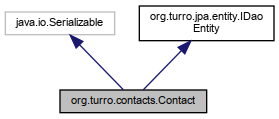
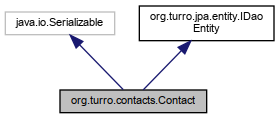
Public Member Functions | |
| String | getId () |
| String | getEmailAccount () |
| void | setEmailAccount (String emailAccount) |
| ContactType | getType () |
| void | setType (ContactType type) |
| ComplexName | getComplexName () |
| void | setComplexName (ComplexName complexName) |
| String | getOwner () |
| void | setOwner (String owner) |
| boolean | isOnlyOwner () |
| void | setOnlyOwner (boolean onlyOwner) |
| boolean | isWebapp () |
| void | setWebapp (boolean webapp) |
| boolean | isUserMenu () |
| void | setUserMenu (boolean userMenu) |
| boolean | isDeactivated () |
| void | setDeactivated (boolean deactivated) |
| boolean | isInactive () |
| void | setInactive (boolean inactive) |
| String | getName () |
| void | setName (String name) |
| Currency | getCurrency () |
| void | setCurrency (Currency currency) |
| Locale | getLocale () |
| void | setLocale (Locale locale) |
| String | getLogin () |
| void | setLogin (String login) |
| String | getPass1 () |
| void | setPass1 (String pass1) |
| String | getPass2 () |
| void | setPass2 (String pass2) |
| String | getGlobalIdentifier () |
| void | setGlobalIdentifier (String globalIdentifier) |
| TimeZone | getTimeZone () |
| void | setTimeZone (TimeZone timeZone) |
| String | getGrouping () |
| void | setGrouping (String grouping) |
| String | getIdActivity () |
| void | setIdActivity (String idActivity) |
| double | getBilling () |
| void | setBilling (double billing) |
| double | getStaff () |
| void | setStaff (double staff) |
| double | getLatitude () |
| void | setLatitude (double latitude) |
| double | getLongitude () |
| void | setLongitude (double longitude) |
| String | getLangTranslator () |
| void | setLangTranslator (String langTranslator) |
| boolean | isCloudAdmin () |
| void | setCloudAdmin (boolean cloudAdmin) |
| JobBoard | getJobBoard () |
| void | setJobBoard (JobBoard jobBoard) |
| Set< Address > | getAddresses () |
| void | setAddresses (Set< Address > addresses) |
| Set< Connector > | getConnectors () |
| void | setConnectors (Set< Connector > connectors) |
| Set< BusinessRelation > | getBusinessRelations () |
| void | setBusinessRelations (Set< BusinessRelation > businessRelations) |
| Set< BusinessRelation > | getWorkerRelations () |
| void | setWorkerRelations (Set< BusinessRelation > workerRelations) |
| Set< Syndication > | getSyndications () |
| void | setSyndications (Set< Syndication > syndications) |
| Set< Comment > | getComments () |
| void | setComments (Set< Comment > comments) |
| Set< FieldValue > | getFieldValues () |
| void | setFieldValues (Set< FieldValue > fieldValues) |
| Set< ContactService > | getServices () |
| void | setServices (Set< ContactService > services) |
| Object | entityId () |
| boolean | isEmpty () |
| String | getFriendly () |
| String | getFormal () |
| void | setPlainPass (String text) |
| IContact | getIContact () |
| boolean | hasLocation () |
| boolean | isWebUser () |
| String | getTradeName () |
| Map< String, Connector > | getConnectorMap () |
| Map< String, Address > | getAddressMap () |
| Map< String, FieldValue > | getFieldMap () |
| Map< String, Comment > | getCommentMap () |
| Map< String, Syndication > | getSyndicationMap () |
| String | getComment (IConstructor constructor, String key) |
| String | getFullName () |
| void | setAttribute (String key, Object value) |
| Object | getAttribute (String key) |
| MyDataList | getMyData () |
| void | checkEmptyness () |
| String | getTagsString () |
| String | getRolesString () |
| String | getSocialGroupsString () |
| String | getLocaleString (Locale currLocale) |
| boolean | isValidLogin () |
| boolean | getCanShow (String userId) |
| Business | getBusinessSet () |
| Workers | getWorkerSet () |
| Contact | getBusiness () |
| List< Contact > | getBusinessList () |
| List< Contact > | getCoworkers () |
| List< Contact > | getCoworkers (Contact business) |
| List< Contact > | getWorkers () |
| boolean | isInBusiness (Contact worker) |
| boolean | isInBusiness (IContact worker) |
| Object | getObject (String key) |
| void | setObject (String key, Serializable value) |
| Profile | getProfile () |
| Profile | getEditProfile () |
| MappingSet | getSerializerMappings () |
| int | hashCode () |
| boolean | equals (Object obj) |
 Public Member Functions inherited from org.turro.jpa.entity.IDaoEntity Public Member Functions inherited from org.turro.jpa.entity.IDaoEntity | |
| default boolean | isNew () |
| default void | prepareSave () |
| default void | prepareDelete () |
| default void | removeEmpties () |
| default Collection< Collection > | collections () |
Protected Member Functions | |
| void | setId (String id) |
Definition at line 52 of file Contact.java.
| void org.turro.contacts.Contact.checkEmptyness | ( | ) |
Definition at line 564 of file Contact.java.

| Object org.turro.contacts.Contact.entityId | ( | ) |
Implements org.turro.jpa.entity.IDaoEntity.
Definition at line 454 of file Contact.java.
| boolean org.turro.contacts.Contact.equals | ( | Object | obj | ) |
Definition at line 761 of file Contact.java.
| Set<Address> org.turro.contacts.Contact.getAddresses | ( | ) |
Definition at line 355 of file Contact.java.

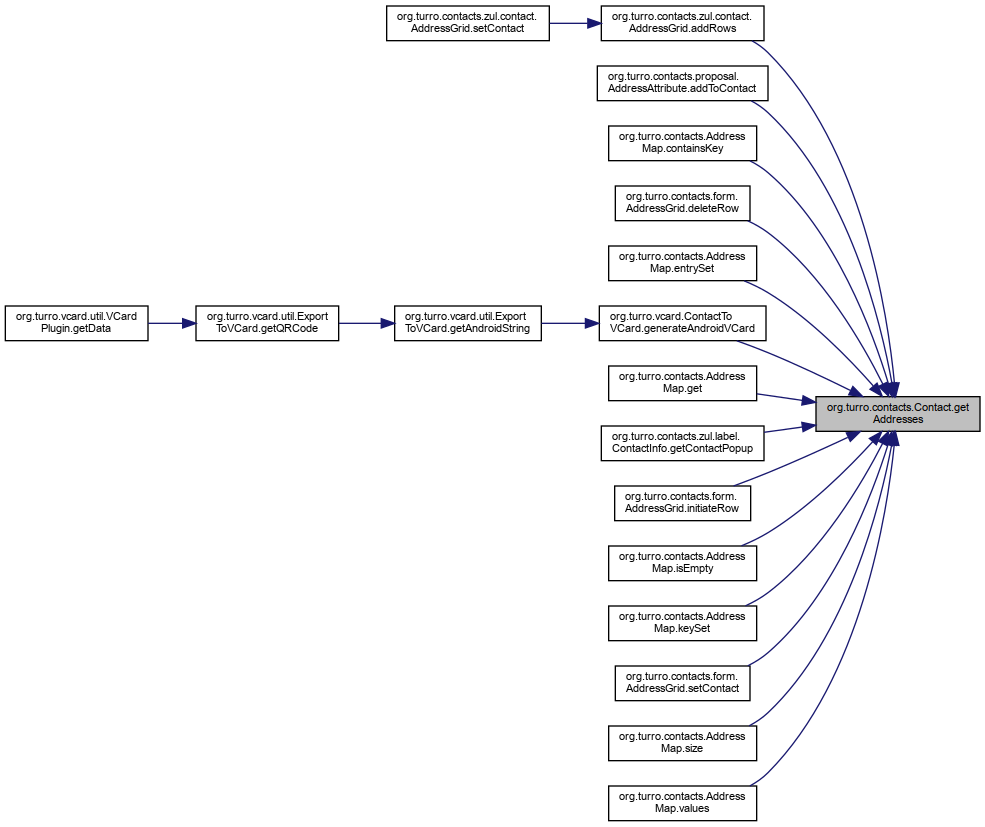
| Map<String, Address> org.turro.contacts.Contact.getAddressMap | ( | ) |
| Object org.turro.contacts.Contact.getAttribute | ( | String | key | ) |
| double org.turro.contacts.Contact.getBilling | ( | ) |
Definition at line 299 of file Contact.java.
| Contact org.turro.contacts.Contact.getBusiness | ( | ) |
Definition at line 628 of file Contact.java.


| List<Contact> org.turro.contacts.Contact.getBusinessList | ( | ) |
Definition at line 632 of file Contact.java.

| Set<BusinessRelation> org.turro.contacts.Contact.getBusinessRelations | ( | ) |
Definition at line 379 of file Contact.java.

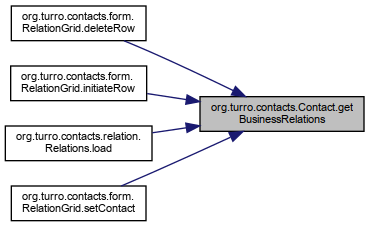
| Business org.turro.contacts.Contact.getBusinessSet | ( | ) |
| boolean org.turro.contacts.Contact.getCanShow | ( | String | userId | ) |
onlyOwner || owner.equals(userId);
Definition at line 605 of file Contact.java.
| String org.turro.contacts.Contact.getComment | ( | IConstructor | constructor, |
| String | key | ||
| ) |
Definition at line 519 of file Contact.java.


| Map<String, Comment> org.turro.contacts.Contact.getCommentMap | ( | ) |
Definition at line 511 of file Contact.java.
| Set<Comment> org.turro.contacts.Contact.getComments | ( | ) |
Definition at line 415 of file Contact.java.

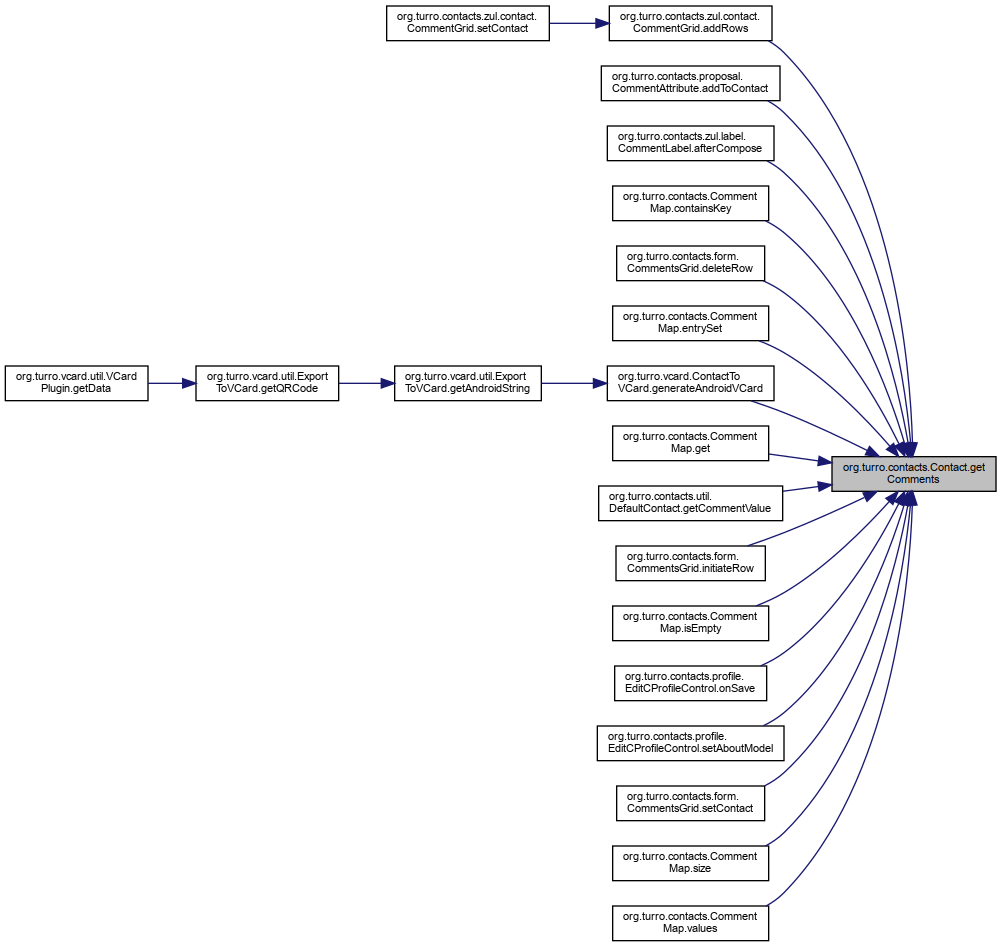
| ComplexName org.turro.contacts.Contact.getComplexName | ( | ) |
| Map<String, Connector> org.turro.contacts.Contact.getConnectorMap | ( | ) |
| Set<Connector> org.turro.contacts.Contact.getConnectors | ( | ) |
Definition at line 367 of file Contact.java.

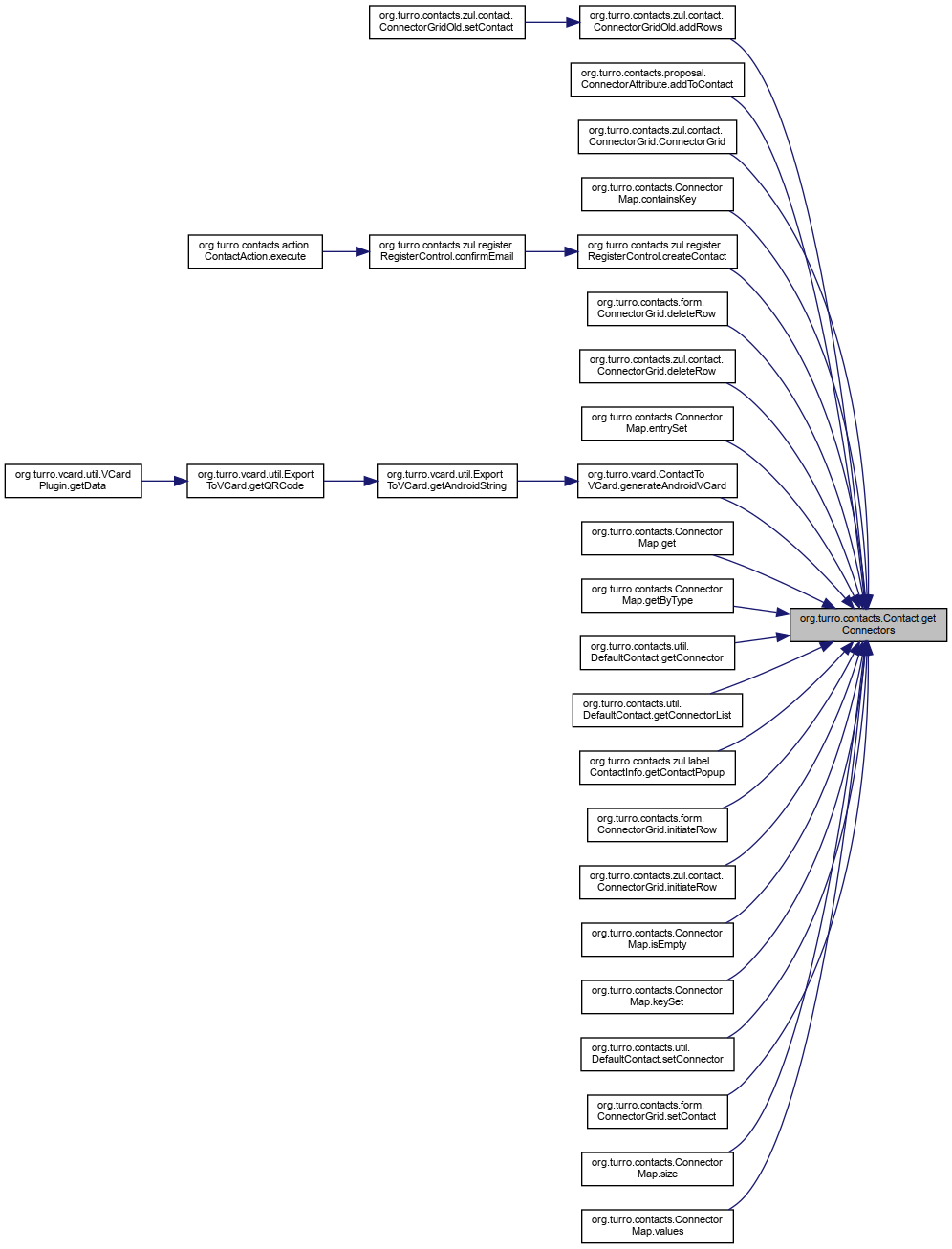
| List<Contact> org.turro.contacts.Contact.getCoworkers | ( | ) |
Definition at line 636 of file Contact.java.

| Currency org.turro.contacts.Contact.getCurrency | ( | ) |
Definition at line 221 of file Contact.java.


| Profile org.turro.contacts.Contact.getEditProfile | ( | ) |
| String org.turro.contacts.Contact.getEmailAccount | ( | ) |
| Map<String, FieldValue> org.turro.contacts.Contact.getFieldMap | ( | ) |
Definition at line 507 of file Contact.java.
| Set<FieldValue> org.turro.contacts.Contact.getFieldValues | ( | ) |
Definition at line 427 of file Contact.java.

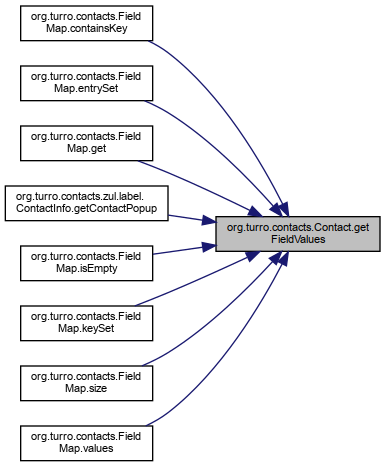
| String org.turro.contacts.Contact.getFormal | ( | ) |
| String org.turro.contacts.Contact.getFriendly | ( | ) |
Definition at line 465 of file Contact.java.

| String org.turro.contacts.Contact.getFullName | ( | ) |
Definition at line 544 of file Contact.java.


| String org.turro.contacts.Contact.getGlobalIdentifier | ( | ) |
| String org.turro.contacts.Contact.getGrouping | ( | ) |
| IContact org.turro.contacts.Contact.getIContact | ( | ) |
| String org.turro.contacts.Contact.getId | ( | ) |
| String org.turro.contacts.Contact.getIdActivity | ( | ) |
Definition at line 291 of file Contact.java.
| JobBoard org.turro.contacts.Contact.getJobBoard | ( | ) |
| String org.turro.contacts.Contact.getLangTranslator | ( | ) |
| double org.turro.contacts.Contact.getLatitude | ( | ) |
| Locale org.turro.contacts.Contact.getLocale | ( | ) |
Definition at line 232 of file Contact.java.


| String org.turro.contacts.Contact.getLocaleString | ( | Locale | currLocale | ) |
| String org.turro.contacts.Contact.getLogin | ( | ) |
| double org.turro.contacts.Contact.getLongitude | ( | ) |
| MyDataList org.turro.contacts.Contact.getMyData | ( | ) |
Definition at line 557 of file Contact.java.
| String org.turro.contacts.Contact.getName | ( | ) |
| Object org.turro.contacts.Contact.getObject | ( | String | key | ) |
Definition at line 658 of file Contact.java.


| String org.turro.contacts.Contact.getOwner | ( | ) |
| String org.turro.contacts.Contact.getPass1 | ( | ) |
| String org.turro.contacts.Contact.getPass2 | ( | ) |
| Profile org.turro.contacts.Contact.getProfile | ( | ) |
| String org.turro.contacts.Contact.getRolesString | ( | ) |
| MappingSet org.turro.contacts.Contact.getSerializerMappings | ( | ) |
Definition at line 705 of file Contact.java.
| Set<ContactService> org.turro.contacts.Contact.getServices | ( | ) |
| String org.turro.contacts.Contact.getSocialGroupsString | ( | ) |
| double org.turro.contacts.Contact.getStaff | ( | ) |
Definition at line 307 of file Contact.java.
| Map<String, Syndication> org.turro.contacts.Contact.getSyndicationMap | ( | ) |
| Set<Syndication> org.turro.contacts.Contact.getSyndications | ( | ) |
Definition at line 403 of file Contact.java.

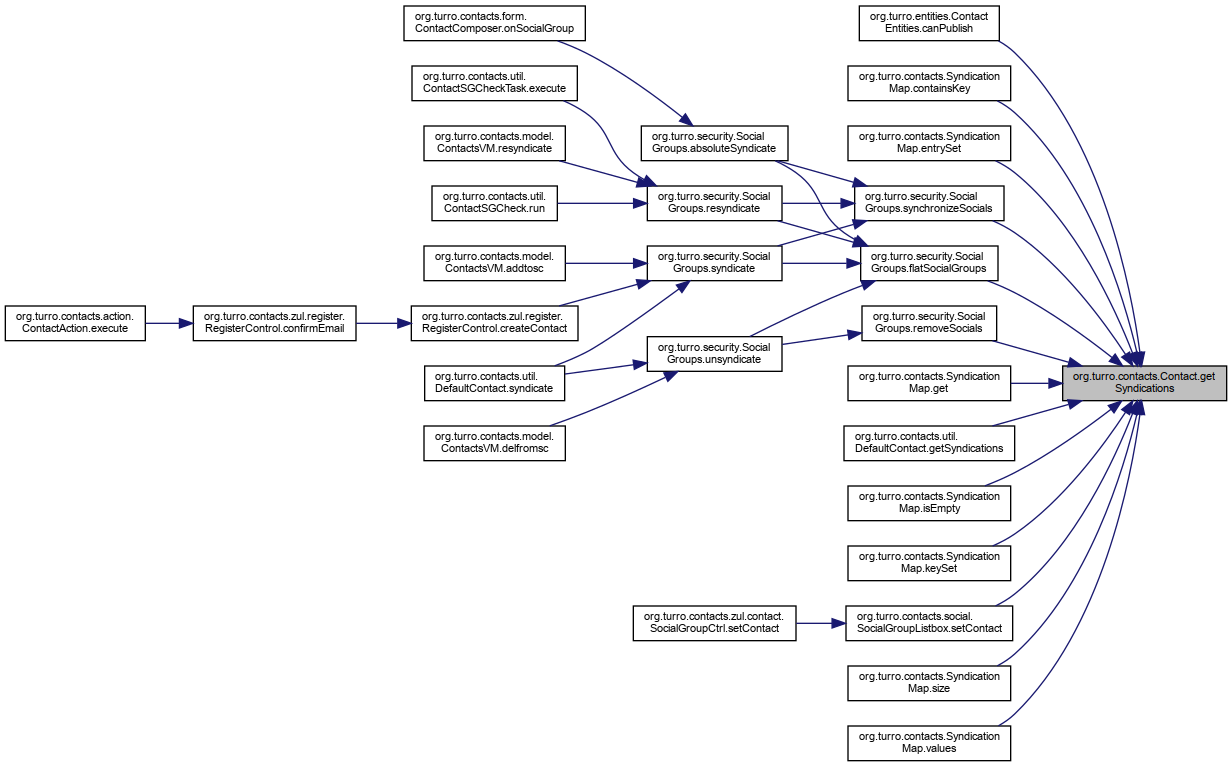
| String org.turro.contacts.Contact.getTagsString | ( | ) |
Definition at line 573 of file Contact.java.


| TimeZone org.turro.contacts.Contact.getTimeZone | ( | ) |
Definition at line 275 of file Contact.java.
| String org.turro.contacts.Contact.getTradeName | ( | ) |
Definition at line 494 of file Contact.java.


| ContactType org.turro.contacts.Contact.getType | ( | ) |
| Set<BusinessRelation> org.turro.contacts.Contact.getWorkerRelations | ( | ) |
Definition at line 391 of file Contact.java.


| List<Contact> org.turro.contacts.Contact.getWorkers | ( | ) |
Definition at line 644 of file Contact.java.

| Workers org.turro.contacts.Contact.getWorkerSet | ( | ) |
| int org.turro.contacts.Contact.hashCode | ( | ) |
Definition at line 754 of file Contact.java.
| boolean org.turro.contacts.Contact.hasLocation | ( | ) |
| boolean org.turro.contacts.Contact.isCloudAdmin | ( | ) |
Definition at line 339 of file Contact.java.
| boolean org.turro.contacts.Contact.isDeactivated | ( | ) |
| boolean org.turro.contacts.Contact.isEmpty | ( | ) |
Implements org.turro.jpa.entity.IDaoEntity.
Definition at line 459 of file Contact.java.

| boolean org.turro.contacts.Contact.isInactive | ( | ) |
| boolean org.turro.contacts.Contact.isInBusiness | ( | Contact | worker | ) |
| boolean org.turro.contacts.Contact.isInBusiness | ( | IContact | worker | ) |
Definition at line 652 of file Contact.java.

| boolean org.turro.contacts.Contact.isOnlyOwner | ( | ) |
Definition at line 172 of file Contact.java.
| boolean org.turro.contacts.Contact.isUserMenu | ( | ) |
| boolean org.turro.contacts.Contact.isValidLogin | ( | ) |
Definition at line 601 of file Contact.java.
| boolean org.turro.contacts.Contact.isWebapp | ( | ) |
| boolean org.turro.contacts.Contact.isWebUser | ( | ) |
Definition at line 489 of file Contact.java.


| void org.turro.contacts.Contact.setAddresses | ( | Set< Address > | addresses | ) |
Definition at line 363 of file Contact.java.
| void org.turro.contacts.Contact.setAttribute | ( | String | key, |
| Object | value | ||
| ) |
| void org.turro.contacts.Contact.setBilling | ( | double | billing | ) |
Definition at line 303 of file Contact.java.
| void org.turro.contacts.Contact.setBusinessRelations | ( | Set< BusinessRelation > | businessRelations | ) |
Definition at line 387 of file Contact.java.
| void org.turro.contacts.Contact.setCloudAdmin | ( | boolean | cloudAdmin | ) |
Definition at line 343 of file Contact.java.
| void org.turro.contacts.Contact.setComments | ( | Set< Comment > | comments | ) |
Definition at line 423 of file Contact.java.
| void org.turro.contacts.Contact.setComplexName | ( | ComplexName | complexName | ) |
Definition at line 157 of file Contact.java.
| void org.turro.contacts.Contact.setConnectors | ( | Set< Connector > | connectors | ) |
Definition at line 375 of file Contact.java.
| void org.turro.contacts.Contact.setCurrency | ( | Currency | currency | ) |
Definition at line 228 of file Contact.java.
| void org.turro.contacts.Contact.setDeactivated | ( | boolean | deactivated | ) |
Definition at line 201 of file Contact.java.
| void org.turro.contacts.Contact.setEmailAccount | ( | String | emailAccount | ) |
Definition at line 140 of file Contact.java.
| void org.turro.contacts.Contact.setFieldValues | ( | Set< FieldValue > | fieldValues | ) |
Definition at line 435 of file Contact.java.
| void org.turro.contacts.Contact.setGlobalIdentifier | ( | String | globalIdentifier | ) |
| void org.turro.contacts.Contact.setGrouping | ( | String | grouping | ) |
Definition at line 287 of file Contact.java.
|
protected |
Definition at line 132 of file Contact.java.
| void org.turro.contacts.Contact.setIdActivity | ( | String | idActivity | ) |
Definition at line 295 of file Contact.java.
| void org.turro.contacts.Contact.setInactive | ( | boolean | inactive | ) |
Definition at line 209 of file Contact.java.
| void org.turro.contacts.Contact.setJobBoard | ( | JobBoard | jobBoard | ) |
| void org.turro.contacts.Contact.setLangTranslator | ( | String | langTranslator | ) |
Definition at line 335 of file Contact.java.
| void org.turro.contacts.Contact.setLatitude | ( | double | latitude | ) |
Definition at line 319 of file Contact.java.
| void org.turro.contacts.Contact.setLocale | ( | Locale | locale | ) |
Definition at line 239 of file Contact.java.
| void org.turro.contacts.Contact.setLogin | ( | String | login | ) |
Definition at line 247 of file Contact.java.
| void org.turro.contacts.Contact.setLongitude | ( | double | longitude | ) |
Definition at line 327 of file Contact.java.
| void org.turro.contacts.Contact.setName | ( | String | name | ) |
| void org.turro.contacts.Contact.setObject | ( | String | key, |
| Serializable | value | ||
| ) |
Definition at line 664 of file Contact.java.


| void org.turro.contacts.Contact.setOnlyOwner | ( | boolean | onlyOwner | ) |
Definition at line 177 of file Contact.java.
| void org.turro.contacts.Contact.setOwner | ( | String | owner | ) |
Definition at line 167 of file Contact.java.
| void org.turro.contacts.Contact.setPass1 | ( | String | pass1 | ) |
| void org.turro.contacts.Contact.setPass2 | ( | String | pass2 | ) |
Definition at line 263 of file Contact.java.
| void org.turro.contacts.Contact.setPlainPass | ( | String | text | ) |
| void org.turro.contacts.Contact.setServices | ( | Set< ContactService > | services | ) |
Definition at line 447 of file Contact.java.
| void org.turro.contacts.Contact.setStaff | ( | double | staff | ) |
Definition at line 311 of file Contact.java.
| void org.turro.contacts.Contact.setSyndications | ( | Set< Syndication > | syndications | ) |
Definition at line 411 of file Contact.java.
| void org.turro.contacts.Contact.setTimeZone | ( | TimeZone | timeZone | ) |
Definition at line 279 of file Contact.java.
| void org.turro.contacts.Contact.setType | ( | ContactType | type | ) |
Definition at line 148 of file Contact.java.
| void org.turro.contacts.Contact.setUserMenu | ( | boolean | userMenu | ) |
| void org.turro.contacts.Contact.setWebapp | ( | boolean | webapp | ) |
Definition at line 185 of file Contact.java.
| void org.turro.contacts.Contact.setWorkerRelations | ( | Set< BusinessRelation > | workerRelations | ) |
Definition at line 399 of file Contact.java.